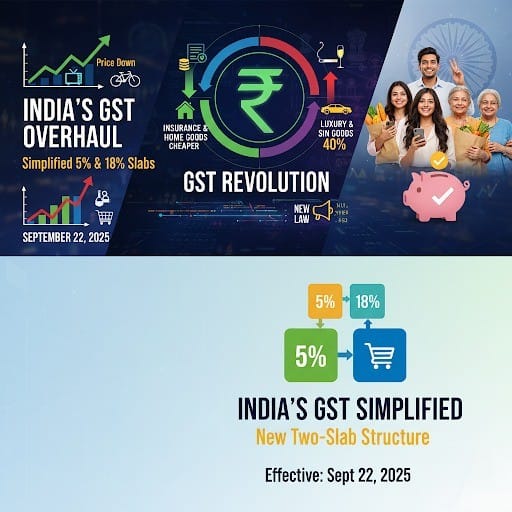
India’s Bold New GST Structure: Simplified Slabs Set to Reshape Economy and Consumer Spending
New Delhi– In a groundbreaking move poised to redefine India’s economic landscape, the Goods and Services Tax (GST) Council has officially approved a sweeping overhaul of the nation’s indirect tax system. Shifting from its existing multi-slab framework, India will now embrace a simplified two-slab structure featuring 5% and 18% GST rates, effective September 22, 2025. This landmark decision, widely dubbed “GST 2.0,” is anticipated to usher in a new era of affordability, streamlined compliance, and accelerated economic growth.
What Gets Cheaper? A Win for the Average Indian Household
The most significant immediate benefit of this reform is the expected reduction in prices across a vast array of goods. Consumers can look forward to more affordable daily essentials and durable items as numerous products shift to lower tax brackets.
- Daily Necessities: Toiletries like hair oil, shampoo, and toothpaste, alongside household goods and kitchenware, are set to become more budget-friendly.
- Mobility: Bicycles, small cars, and motorcycles under 350cc will now fall under the 18% slab, making personal transportation more accessible.
- Consumer Durables: Big-ticket items such as air conditioners and televisions (above 32 inches), previously attracting a 28% GST, will now be taxed at 18%, offering significant savings.
- Food Items: Indian breads, paneer, and UHT milk have been made entirely tax-free, providing relief on staple food items
Insurance Relief: A Major Boost for Financial Security
Perhaps one of the most impactful changes for individual citizens is the complete exemption of individual life and health insurance policies from GST. Previously taxed at 18%, this move will significantly reduce the cost of insurance premiums for products like family floater plans and term insurance. This initiative is expected to enhance financial security for millions and encourage greater penetration of insurance services across the country.
While many items become cheaper, certain “sin goods” and ultra-luxury products will face a new, higher 40% GST slab. This category includes cigarettes, premium liquor, and high-end automobiles. The implementation of these higher rates for tobacco and related products will follow once the government’s compensation cess liabilities are settled. This strategic move aims to offset revenue losses from other reductions and potentially discourage the consumption of these items.
Economic Impact: A Catalyst for Growth and Consumption
Economists and industry experts are largely optimistic about the long-term impact of this GST rationalization. While the immediate fiscal impact from tax reductions is estimated at ₹48,000 crore, government officials anticipate that this will be more than compensated by increased collections driven by:
- Boosted Consumer Demand: Lower prices are expected to stimulate consumer spending, invigorating various sectors.
- Simplified Compliance: A more straightforward tax structure is likely to ease the burden on businesses, particularly SMEs, fostering better compliance and reducing administrative costs.
- Enhanced Investment: A clearer and more predictable tax regime could attract further domestic and foreign investment.
The simplification of India’s GST structure marks a pivotal moment, promising to create a more efficient, equitable, and growth-oriented economic environment for both businesses and everyday citizens.
GST 2.0 Simplified Tax Slabs (Effective September 22, 2025)
| Category | Old GST Rate | New GST Rate | Impact / Benefit |
|---|---|---|---|
| Daily Necessities (toiletries, shampoo, toothpaste, kitchenware) | 12% / 18% | 5% | Essentials become cheaper |
| Mobility (bicycles, small cars, motorcycles <350cc) | 28% | 18% | More affordable personal transport |
| Consumer Durables (ACs, TVs above 32 inches) | 28% | 18% | Big savings on home appliances |
| Food Items (Indian breads, paneer, UHT milk) | 5% | 0% (Exempted) | Staple food items now tax-free |
| Insurance Policies (life & health insurance) | 18% | 0% (Exempted) | Lower premiums, higher financial security |
| “Sin Goods” & Luxury Items (cigarettes, premium liquor, high-end cars) | 28% + Cess | 40% | Higher taxes to offset losses & discourage use |
| Overall Compliance | Multiple slabs (5%, 12%, 18%, 28%) | Simplified: 5% & 18% | Easy compliance for businesses & SMEs |



